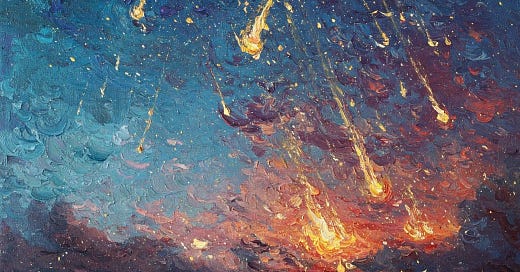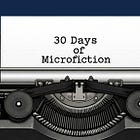How to Depress (and Astonish) Your Readers
Miniature writing lessons from my 100-word microfiction story, “Heavenfall.”
Sometimes you’ll read a story that’s just downright depressing, even though it takes your breath away.
The right story at the right time can inspire you and fill you with hope for the future. Other times, you’ll read one that brings you down, one that exposes you to the darkest depths of despair. And then there are the tales that can somehow do both in equal measure.
This story, “Heavenfall,” does just that.
It tells the story of a mother and a daughter whose village is in desperate need of rain, yet nature has other plans for them. It transforms water, an incredibly precious and life-sustaining resource, into a rarity. But most impressive of all is that it takes something wondrous and turns it into an ill omen.
Read the story here for free (but make sure you come back for the Writer’s Note).
An Atmospheric Setting
And how tone helps to establish expectations.
Right from the start of this story, it’s clear that something is very, very wrong, even if the reader doesn’t know what it is just yet.
The first hints come from thirst and the powerful verb “clawed,” which emphasizes how bad it is. The second comes from the rotting crop fields and the dark clouds overhead, ready to unleash their fury on the world below. While we get a slight reprieve and a bit of comedic relief from Kiera pinching her nose at the smell, the pervasive sense of impending doom is impossible to ignore.
Basically, if you’re in a good mood before reading “Heavenfall,” the atmosphere of this story will change that real quick.
All these details set the tone for the story. There is a sense of dread that hangs over this story and sets certain expectations for the reader. These expectations create tension and anticipation; will it rain, or will it not? These characters’ lives–including the charming little girl–are on the line, and the reader feels the consequences of the day’s storm hanging over them like the rot clinging to the air.
But doom and gloom are momentarily shattered by the coming of the starstorm.
Subverting Audience Expectations
And embrace the fantastic.
My big goal with this story was to use the prompt, “rain,” in an unexpected way.
I started to think: what if it wasn’t water that fell from the sky, but something else? It’s not such a far-fetched idea; on other planets, rain takes different forms, including dry-ice snow on Mars, liquid helium rain on Jupiter, hot sulfuric acid rain on Venus, and even diamonds on Saturn. Compared to some of these horrific flesh-melting weather conditions, a little stardust falling from the sky seems almost magical.
And while the stardust is a beautiful sight to behold, especially for Shela’s daughter, it masks the real problem at hand: the lack of rain.
There is a powerful and conflicting emotional core at the heart of this story, perfectly encapsulated by the ending. Parents have an obligation to preserve the hope and innocence of their children for as long as they can, even when they know things won’t end well. Shela knows what the lack of rain means, yet she still forces down the fear and frustration to lean into her little girl’s astonishment.
It’s beautiful in a tragic kind of way, and while the final line might be a bit on the nose, it’s a poignant end to this miserable little tale.
Problems with Pacing
And perhaps a harsh realization.
It’s tough to properly pace a 100-word microfiction piece, especially when you’re trying to write a complete story with a clear beginning, middle, and end.
While “Heavenfall” starts strong and effectively builds an atmosphere of despair, the middle of the story feels a bit rushed. There is a single sentence of exposition intended to serve as a bridge between the beginning and the end, but it instead actively detracts from the point of the story. This exposition offers an explanation of the starstorm and how hopeful they are for rain, but it also spoils the surprise and steals that moment of subverted expectations from the reader.
And it’s for this reason that I think the story falls apart somewhat in the middle.
There is no transition whatsoever between the elders’ prediction and the storm. The storm abruptly arrives and puts an end to the exposition, as well as any opportunity to build more tension. I’m not sure if it needs more tension, but a bit of buildup following the exposition would serve this story well, even if it’s only a sentence or two.
Or perhaps this story would be better served by a longer word count (as many of these microfiction pieces would be). Something to think about for the future, I suppose.
On Reconsidering Form Factor
Is microfiction the right call for this story?
“Heavenfall” manages to both depress me and fill me with hope at the same time, a rare feat for a piece of microfiction.
While I personally think this is one of my stronger microfiction stories, it suffers from its fair share of problems. The pacing issue could be resolved with a few minor additions, but it would come at the cost of the word count. Still, sometimes it’s worth considering how form factor influences our work, for better or worse.
What are your thoughts? What lessons did you learn from this piece of microfiction? Let me know in the comments.
As always, thanks for reading, and until next time… keep writing!
- Josh
🚨 P.S. Want to learn more about how to write microfiction? Check out my 30-Day Microfiction Challenge. And subscribe today to receive a free microfiction primer right to your inbox. 🚨










What are some of your major takeaways from this microfiction piece? And what would you do to fix this story to make it better (within the confines of the genre)?
Your comment, "It’s beautiful in a tragic kind of way" pretty much sums up my feeling about this piece. I find I wonder at the stardust, but am reminded of the tragedy of the Dust Bowl days of our own US history. My husband's mother lived in Oklahoma during the Dust Bowl, and had told us stories of those days. It was rough, very much like this story.
I guess I expect in 100 word pieces that there will be a minimum of transition. The one sentence about the elders' prediction is almost in answer to Kiera's question, and takes the place of her mother answering. But I see your point, it does steal a bit of the thunder of the end.
I love what you do when you write 100 word pieces. There are choices to be made, and it's the words a writer chooses to use and those he/she chooses to leave out that makes the 100 word drabble so uniquely fascinating. I find I am drawn to reading 100 word pieces, because I have chosen to learn more about writing them, while doing the 30 day Microfiction Challenge. I still do some writing that way.
I agree with you that this piece would be great in a longer length. If you choose to do that sometime in the future, I'll enjoy hearing what you do with it when not restrained by 100 words.